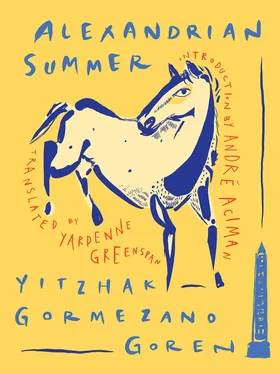He loved little Louis, and almost refused to skip a grade because of him. When they both started at the Alexandria Jewish School, the Lycée de l’Union Juive , (an exceptional institution with no religious affiliation and with classes taught mainly in French, with a skimpy handful of Hebrew and Arabic and a bit more English), they were both immediately enrolled in second grade. They shared a desk and were happy. On the very first day, the teacher asked for a volunteer to come and draw anything they wanted on the blackboard. Robby went to the head of the class and drew a curvy De Soto, the newest model. The teacher was amazed. Children who can draw like that belong in third grade. During French dictation Robby had only four spelling mistakes — once he forgot an s at the end of a plural form, and another time he forgot to double a consonant — nothing major. Kids who can do dictation with only four mistakes belong in third grade. He already knew multiplication and division, though in a slightly different method than that taught by Madame Aguion.
“Who taught you all of this?” asked Mlle. Sasson, his homeroom teacher.
“My sister,” Robby said proudly.
“You don’t belong in second grade,” she announced. “You belong in third grade!”
“And what about Louis?”
“Louis is little!” she determined.
“But …”
“You’re moving to third grade. You’re going to be an architect!” she prophesied.
“I don’t want to skip a grade,” he said gravely.
Mlle. Sasson’s large eyes grew wider. Her thin, translucent skin stretched over the bones of her skull. For a moment she didn’t know what to say. Could it be? Why would a boy want to stay in a lower class when given the opportunity to move ahead?
“I want to be with Louis!” His stubborn eyes focused on the De Soto’s round contours. He wished he could wipe that perfection away with a wave of a hand.
“Fine, sit down.”
But the teacher didn’t give up. She spoke with Madame Aguion, the principal, who spoke with Robby’s parents. His parents convinced him to move to third grade, and he did. At the end of the year he was second in his class and won the Tableau d’honneur , a sign of appreciation for his achievements. Second, not first. Why not first? Two opponents fought him for the desired title: little Lilianne, with her fox-face and dimples, and Fifi, with the dreamy eyes and the deep, throaty voice. Lilianne came in third, and Fifi first. Robby thought: if I even know what love is, I think I love Fifi. She always had the right answers. She wasn’t brilliant, but she was calculating and calm, making his heart twirl with her quiet, confident voice. Victor asked him that afternoon if he didn’t want to screw Fifi, and Robby hated him for this intrusion upon his lofty emotions.
The sounds of Monti’s Csárdás , played on the violin by Marcel, reached Robby’s mind through a fog. He liked watching his cousin play: the closed eyes, the chin leaning against the instrument, the relaxed concentration, all in contrast with the quickness of the playing hand, a breath-taking striving toward perfection. A great future had been foretold for Marcel. Next to him was his younger brother, Roger. Roger was retarded. No one foretold anything for him. Children made fun of him, grownups nodded at him politely, and a wily tumor kept growing inside his brain, pushing everything off toward the walls of his skull. His face was covered in fresh, ugly bruises from the falls he had whenever he lost his balance. He died that very summer. Robby didn’t go to the funeral. They tried to shield children from such harsh experiences. Roger’s mother hardly shed a tear for him. His old nanny, who took devoted care of him through all his years of illness, cried her heart out.
Happily, thanks to Marcel’s playing, Robby’s entrance did not receive any attention. He was a star tired of the limelight, craving anonymity. He sat down next to his mother and leaned his head against her arm.
David Hamdi-Ali sat in the middle of the hall, very close to Robby’s sister, and the two of them were in the midst of a giggly conversation, ignoring all the hints and gestures and even bitter words that let them know that their brash chatting was interrupting the recital.
Sunken between the sofa cushions, Robby’s sister’s warm breath tickling his face, David was the happiest man alive. His fast, agile horse, Esperance, had beat Ahmed Al-Tal’ooni’s horse. He was proud. He finally broke the prestige of “unbeatable” Al-Tal’ooni, the Muslim jockey, the star who had come all the way from the wandering tribes of the Libyan Desert to the refined racetracks of Alexandria, and who instantly became the pet of the city’s European women. Ahmed was black, skinny and shrunken as a carob that had dried in the sun. Among his proud, masculine tribe he was considered to be an unfortunate genetic mistake. His father barely acknowledged him, and all agreed that the rough desert, which had its own wise natural selection, would find the only solution for this strange creature. He was neglected and forgotten, exempt from any and all duties, and could give himself completely to his one passion: riding horses through the desert. Legend has it that one day the head of the Bedouin tribe threw a hafla , a feast, in honor of the British consul, who occasionally liked to put on a Lawrence of Arabia gown and visit tents and sit on the ground and eat with his hands. As part of the feast, the sheikh arranged a Fantaziya —an eques-trian extravaganza starring the entire shabab , the gang of young, beautiful, strong tribe members. In the middle of the show, the mysterious black knight emerged from the heart of the desert, shocking everyone with riding skills never seen before from Mecca to Benghazi. The Muslims swore that this horseman was born of the desert, while the British consul mumbled, “Sir Ivanhoe, I presume?” raising polite laughter among the European posse. When the black knight unveiled his face, the amazement reached its crescendo. The consul’s wife immediately decided to adopt the boy, turning him into the playboy of Alexandria’s high and bored society. His highness did not think much of the idea, but since he was twice as old as his wife, he dared not stand in the way of her follies. The sheikh, the boy’s father, saw it as his duty to decrease Ahmed’s perceived value and revealed each one of his shortcomings, even going so far as offering her the pick of his fifty sons, all large and burly, a sight for sore eyes. But the lady insisted. The sheikh could not understand how such a beautiful woman could choose the ugliest, most crooked of them all, but since he didn’t want to insult his guests, he agreed to give them the boy. The legend does not explicate the nature of the relation-ship between the lovely consul’s wife and her insect-like adoptee, but reality shows us that the lady turned the wild beast into a star of the racetrack. His name was heard beyond the borders of Egypt, exciting the imaginations of quite a few European women.
David Hamdi-Ali was proud of having beaten a legend.
But that wasn’t on his mind at that moment. Tonight she’s mine, he thought. She’s finally mine. Perhaps she’ll even let me touch her breasts. Not by coincidence, a fake accident, but for real, and these hands will fondle them. Robby’s sister wondered why he kept kneading his handkerchief. Damn! Those breasts, so close, yet so far. Will she let me kiss them? Maybe she’ll let me touch them but not kiss them, or maybe she’ll let me kiss them but not t… No, logic determines that she’ll let me touch them but not kiss them, or maybe not even touch. Damn! Those breasts, so close, yet so far …
Dried fruits, almonds and nuts were served. The kadaif and the boyos had already been brought out. Marzipan too, called massapán in Spanish, and called by Robby’s grandmother pita d’almendra , almond pastry.
Читать дальше












